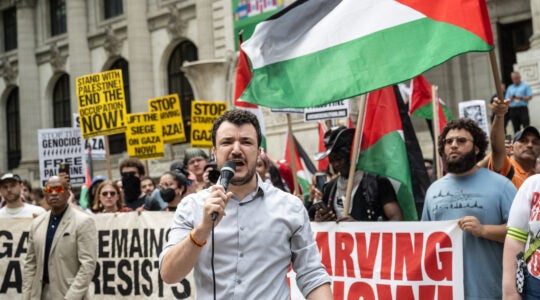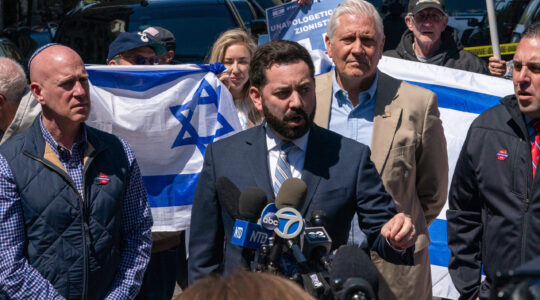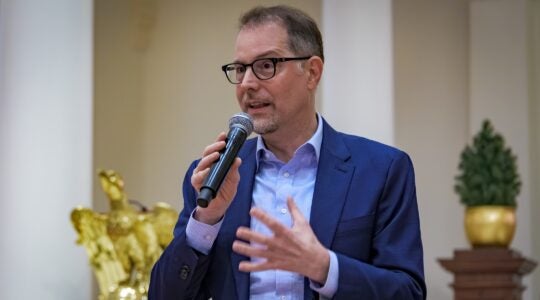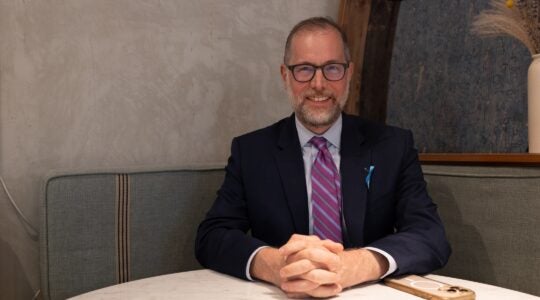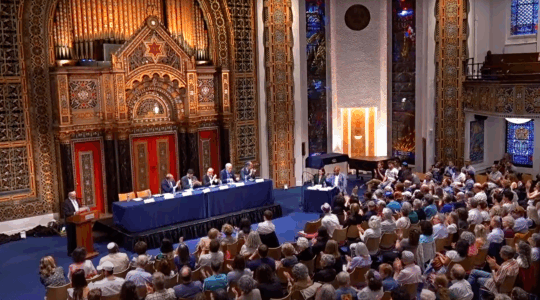WASHINGTON (JTA) — The incumbent president called it a “holiday,” until he called it “Chanukah,” and a few Jews wondered if their fellows weren’t being oversensitive about it. A former president asked for “Al Het” — out of season, but maybe not out of place.
Who said Chanukah isn’t touchy-feely? Well, touchy anyway.
President Obama’s Chanukah party last week, on the fifth night of Chanukah, was perhaps the most watched since, well, his immediate predecessor’s first Chanukah party in 2001.
President Bush’s party that year engendered a degree of controversy over who was and wasn’t invited, but the fact that he was establishing a tradition of a formal party — previous presidents had lit a menorah and not much more — shunted aside hurt feelings.
Obama, on the other hand, had an eight-year-old tradition with which to contend — and rumors, repeated in media outlets with unclear sourcing, that he was inviting “only” 400 guests as opposed to the 800 or so Bush had invited. Moreover, some guests complained that the invitation was for a “holiday” event.
“Bush always mentioned Chanukah,” one invitee griped to JTA.
The White House shot back through The New York Times, saying that in fact 550 were on the guest list and that was consistent with Bush-era parties.
As for “holiday,” that’s the word that appeared on Christmas-related invitations as well, JTA learned. In any case, a gift program handed to guests as they arrived celebrated “Hanukkah, the festival of lights.”
The program also went into great detail about the kosher certification of every available item — a first, according to insiders. It guaranteed that “all meats are Glatt Kosher, all baked goods are Pas Yisroel, all wines are Mevushal, all foods have been prepared Lemihadrin with a Mashgiach Temidi.” The page was graced by an engraving of the White House.
The menu included latkes, London broil and lox. Catering was by Dahan, the premiere kosher outfit in the Washington area, but some foods were prepared on the premises. White House stoves were kashered before the event, and the resultant heat set off an alarm that sent the Secret Service into the kitchen to make certain all was OK.
White House staff, from the president on down, appeared sensitive to the controversies. Obama, posing in an adjacent room with a select few — including Supreme Court Justice Ruth Bader Ginsburg — told the photographer to keep the Christmas tree out of the shot.
Officials made advance calls about the color scheme of the souvenir booklet — which was more “Jewish”? Blue and silver or blue and gold? (Blue and silver.)
In the end, no one was counting heads, and a good time was had by all, at least according to post-party analysis, although there were a couple of lingering complaints: Obama spent only about 20 minutes at the party, and there was no receiving line.
“It’s not an unreasonable thing for people to want to have a picture taken,” said Mort Klein, who attended in his capacity as president of the Zionist Organization of America. “It shouldn’t be dismissed as silly.”
Rabbi Levi Shemtov, who heads American Friends of Lubavitch and organized the kosher certification, wondered if that wasn’t a kvetch too far.
“Everyone would have loved a receiving line but somehow or other, unfortunately, it does not seem constitutionally mandated,” he said. “There were certain small changes in style, but not in substance.”
Attendees made the most of their few seconds with the president. Klein, whose organization has been critical of Obama on several fronts, thanked Obama for speaking out against Palestinian incitement and handed him a Jerusalem Post story showing that the ruling Fatah Party still obliterates Israel in its symbol.
“That is incitement,” Klein reported Obama as saying.
Another party-goer who got face-time with the president was Ari Teman, the founder of J-Corps, a group that promotes voluntarism, and the winner of the first “Jewish Community Hero” citation by the Jewish Federations of North America.
Teman, 27, who also is a stand-up comic, e-mailed friends that he earned a presidential laugh and a hug with a joke (“They’re calling Obama a Nazi … which I think is fantastic … Because if you thought the presidency was a tough job for a black guy to get. Nazi? We have overcome! Mr. President, you are breaking down color barriers!”).
Ethan and Esther Moran, and Alison Buckholtz, the children and wife of Navy Cmdr. Scott Moran, who is stationed in Iraq, lit the candles on the historical menorah on loan from the Prague Jewish museum. The first lady, Michelle Obama, asked to borrow the menorah after learning during a summertime visit to the Czech capital how it was hidden from the Nazis.
In his own Chanukah message, Obama spoke of social justice.
“Jews have lit the Chanukah candles as symbols of resilience in times of peace, and in times of persecution — in concentration camps and ghettos; war zones and unfamiliar lands,” he said. “Their light inspires us to hope beyond hope, to believe that miracles are possible even in the darkest of hours.”
The message didn’t exactly jibe with Chanukah’s tale of a bloody Jewish revival, but Obama was not alone in seizing the holiday to send an untimely message, if nonetheless welcome. In a Chanukah letter, Jimmy Carter asked the Jewish community for forgiveness for any stigma he may have caused Israel.
“We must recognize Israel’s achievements under difficult circumstances, even as we strive in a positive way to help Israel continue to improve its relations with its Arab populations, but we must not permit criticisms for improvement to stigmatize Israel,” the ex-president wrote in the letter released through JTA. “As I would have noted at Rosh Hashanah and Yom Kippur, but which is appropriate at any time of the year, I offer an Al Het for any words or deeds of mine that may have done so.”
“Al Het” refers to the Yom Kippur prayer asking God forgiveness for sins committed against Him. In modern Hebrew it refers to any plea for forgiveness.
Carter has angered some U.S. Jews in recent years with writings and statements that place the burden of peacemaking on Israel, that have likened Israel’s settlement policies to apartheid, and that have blamed the pro-Israel lobby for inhibiting an evenhanded U.S. foreign policy.
Abraham Foxman, the Anti-Defamation League’s national director, welcomed the statement, calling it the “beginning of reconciliation.”
“We welcome any statement from a significant individual such as a former president who asks for Al Het,” Foxman said. “To what extent it is an epiphany, time will tell. There certainly is hurt which needs to be repaired.”
The White House Party has gotten the most attention, but it wasn’t the only Chanukah action in town — far from it.
The force behind much of this week’s action was Shemtov.
The major Chabad event was the lighting of the national menorah on Dec. 13, the third night, when Rahm Emanuel, the White House chief of staff, presided over the festivities. Shemtov also ran events for women, children and university students at his headquarters and at George Washington University, as well as a congressional and a Pentagon lighting.
The Chabad event Dec. 15 on the Hill — formally under the aegis of the “Capitol Jewish Forum” — benefited from motivation: A dozen or so Jewish lawmakers who had just voted to enhance sanctions against Iran were raring to speechify about Jewish survival. Voting on the bill ended at 5:30 p.m., and the candlelighting was scheduled for 10 minutes later in the Capitol’s august Mansfield Room.
Lubavitch also organized a Pentagon lighting the next day, just before the White House party. Headlining the Pentagon event was Gen. Norton Schwartz, the Air Force chief of staff, who spoke of how proud his dad would have been to see him at an event joining his military career and his Jewish upbringing. Defense attaches for the Israeli, Moroccan and Bahraini embassies posed for photos with Schwartz.
There was plenty of shuttling among parties. For instance, the same faces could be seen at a string of Dec. 16 events, starting with the Pentagon lighting at 3 p.m. Next came the White House party starting at 4:30 p.m., then an event at the Library of Congress at 6 p.m. hosted by U.S. Rep. Debbie Wasserman Schultz (D-Fla.), and the Indian Embassy’s annual Chanukah party at 6:30 p.m.
Lightening the mood at Tuesday’s event at the Israeli Embassy was U.S. Ambassador Michael Oren’s patter — he alleviated Rabbi Jeffrey Wohlberg’s very serious sermon about Jewish assimilation with his own diplomatic warning about the latkes.
Oren began, “What the Greeks and Romans couldn’t do to the Jews …”
The night before, Oren hosted a candlelighting at his home with Ben Affleck, a leader of Hollywood’s liberal activist community, in attendance.
Oren also showed up for the popular “latkes and vodka” party thrown each year by Rabinowitz-Dorf, a PR and political consulting firm that boasts many Jewish organizations as clients. He raised a shot of Grey Goose to peace with co-directors Steve Rabinowitz and Matt Dorf.
Consumed at the event: More than a thousand latkes, 15 liters of vodka, six liters of single malt scotch and four cases of Dreid-ale.
The line of the week came during Chanukah Happy Hour on the Hill Sunday night, the event organized by the young adult affiliates of a number of Jewish groups. The event packed three floors at Pour House, a popular Hill watering hole.
One young lady was overheard giving an eager guy the worst brushoff ever, considering the venue: “I don’t really like Jewish guys.”
JTA has documented Jewish history in real-time for over a century. Keep our journalism strong by joining us in supporting independent, award-winning reporting.
